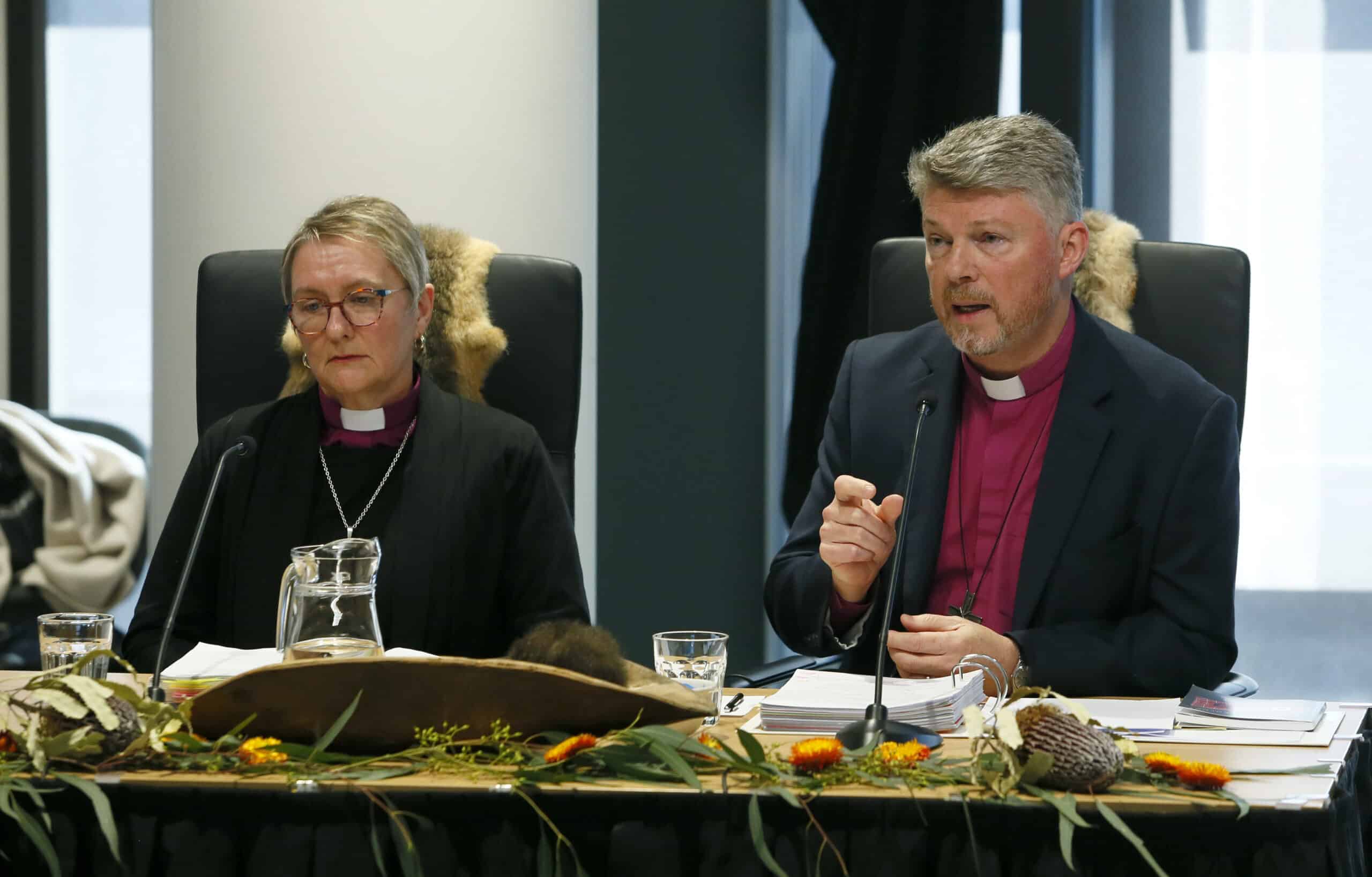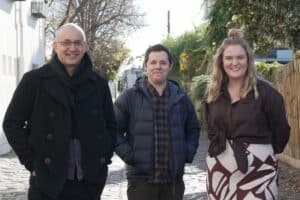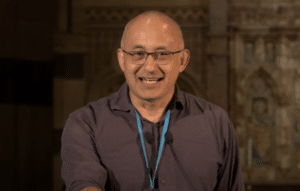
Penny Mulvey
3 May 2024
Walking into the room which has hosted hearings of the Yoorrook Justice Commission for the past two-and-a-half years, the weightiness of its purpose was palpable.
Constituted by the Governor of Victoria, the Honourable Linda Dessau AC, in 2021, the Yoorrook Royal Commission has been making enquiries into “historical systemic injustice perpetrated by State and Non-State entities against First Peoples since the start of colonisation”.
This is heavy work. The five commissioners carry an enormous load as they read submissions, both personal and corporate, hear stories, question witnesses and model Truth Telling.
Wednesday 1 May was the last day of the Land, Sky and Waters hearings. Representatives of the Anglican Province of Victoria, the Uniting Church Synod of Victoria and Tasmania and the Catholic Archdiocese of Melbourne appeared as witnesses.
The Anglican Church was represented by Bishop of Marmingatha Genieve Blackwell and Bishop of Gippsland Richard Treloar.
Those participating in the Truth Telling hearing were seated at tables in the round. The tables were decorated with Australian natives, including eucalyptus leaves and banksias, and different chairs had possum skins laid over their backs.
Counsel assisting Tim Goodwin stood at a lectern asking questions of the churches panel, who were sitting together facing the screen, with the five Commissioners to their left.
Each church was invited to make an opening statement with Bishop Treloar speaking first on behalf of the dioceses of Melbourne, Bendigo, Wangaratta and Gippsland. His first words were of repentance for the terrible legacy that the Anglican Church has wrought on First Nations people.
Bishop Richard described the Commission as a further step towards a hopeful future, as we address the unhealed wound in our church and in our nation.
Very quickly, the discussion turned to a key issue that has led to the disempowerment of native peoples across the globe through colonisation: the Doctrine of Discovery.
This was a set of international legal principles, originally enacted by the 15th century Catholic Church which proclaimed the right of Christian nations to take possession of the lands of non-Christians to save their souls. Ultimately it was about acquisition of new territory and sovereignty over it.
The Doctrine of Discovery was only officially repudiated by the Pope on 30 March last year. It was a doctrine that significantly influenced Australia’s colonial past: Terra Nullius (empty land). The Church representatives acknowledged that churches were complicit in what was illegitimate colonisation and that this is part of our collective history.
In response to this conversation, Commissioner Anthony North KC sought to foreshadow a question, as he addressed witnesses.
“We are charged with working out what to do about the history of injustices to Aboriginal people. We have a difficult job to untangle the colonial mess,” Mr North said.
“It is not just about acknowledging past injustices, but doing something. What ideas do you have of what could be done? You are large institutions which could contribute to addressing the injustices.”
The question was left hanging.
Each church was then invited to speak about its own history in how colonisation unfolded in the state of Victoria.
Bishop Treloar spoke of the rise of mission societies and their influence in the colonies in eastern Australia.
He described the paradox of the Church of England Mission to Aborigines providing protection while co-operating with government policies that were causing cultural genocide. He acknowledged that deep seated racism had a devastating impact on the Aboriginal population both physically and spiritually.
The system itself was irredeemably broken, the Bishop of Gippsland said.
“It was a fundamentally flawed premise, built on the original sin of Australia’s colonisation: acting without consent,” he said.
“It is hard to preach the gospel on stolen land.”
Bishop Treloar acknowledged the paternal environment, the ignorance of any pre-existing spirituality, and the assumptions of cultural superiority behind the “protectionist desire to Christianise” reflected in Select Committee Reports from both Britain and the new colony in Victoria.
“The missions and reserves system marked the beginning of Aboriginal deaths in custody,” he said.
“They were places of confinement. These are very, very hard truths.”
Commissioner Travis Lovett was direct, asking Bishop Treloar, “In the context of racism, does your church say your beliefs are superior to ours?” “Absolutely not,” was the quick response.
Bishop Treloar said the Anglican Church was repenting of the past, seeking to move forward in a respectful partnership. He admitted that moving Aboriginal peoples onto reserves and missions was an act of dispossession, resulting in intergenerational trauma.
Counsel assisting turned the panel discussion more directly to the issue of land, of stolen land and of reparation.
Each Church had been directly asked about the present total size and financial value of their individual land holdings. The Anglican submission was the only one that openly disclosed its figures. In its response to “Request No 5” about current holdings, the Anglican Province of Victoria responded with the following detail:
- Diocese of Melbourne: 160 hectares, valued approx. at $1.38 billion.
- Diocese of Bendigo: 30 hectares, valued approx. $35.6 million.
- Diocese of Wangaratta: 30.65 hectares, approx. $30 million.
- Diocese of Gippsland: 39.4 hectares, approx. $45 million.
(The Diocese of Ballarat provided a separate submission.)
The commissioners acknowledged the transparency of the Anglican delegation. All three churches accepted the disparity of land ownership between churches and First Nations people. None of the churches had current policies regarding land repatriation. What monies were put aside for Aboriginal groups related to ministry work.
The Anglican representatives agreed that the church had knowingly taken away land from Aboriginal people.
Again, Commissioner Lovett challenged the Church witnesses asking them how the admission of stolen lands sat with their Christian beliefs. There was no easy answer to that question, although speaking on behalf of the Diocese of Gippsland, Bishop Treloar reiterated his opening apologies to First Nations peoples who were traumatised and dispossessed, offering the Church’s commitment to reparation.
Bishop Blackwell also acknowledged the continuing willingness of First Nations people to engage with the Church, what she described as “an incredible sign of grace”.
Both bishops made clear that the Anglican Church in Victoria wanted to be part of a society-wide solution. That, the Church looked forward to the outcomes of this Commission process.
“I feel privileged to be part of truth-telling,” Bishop Blackwell told the Commissioners. “It is painful but important to sit with and moving forward is costly.”
“As Christian Churches, we have been complicit in injustice, but we want to be part of the solution.”
Video of the hearings is available here.
For more faith news, follow The Melbourne Anglican on Facebook, Instagram, or subscribe to our weekly emails.







One Response